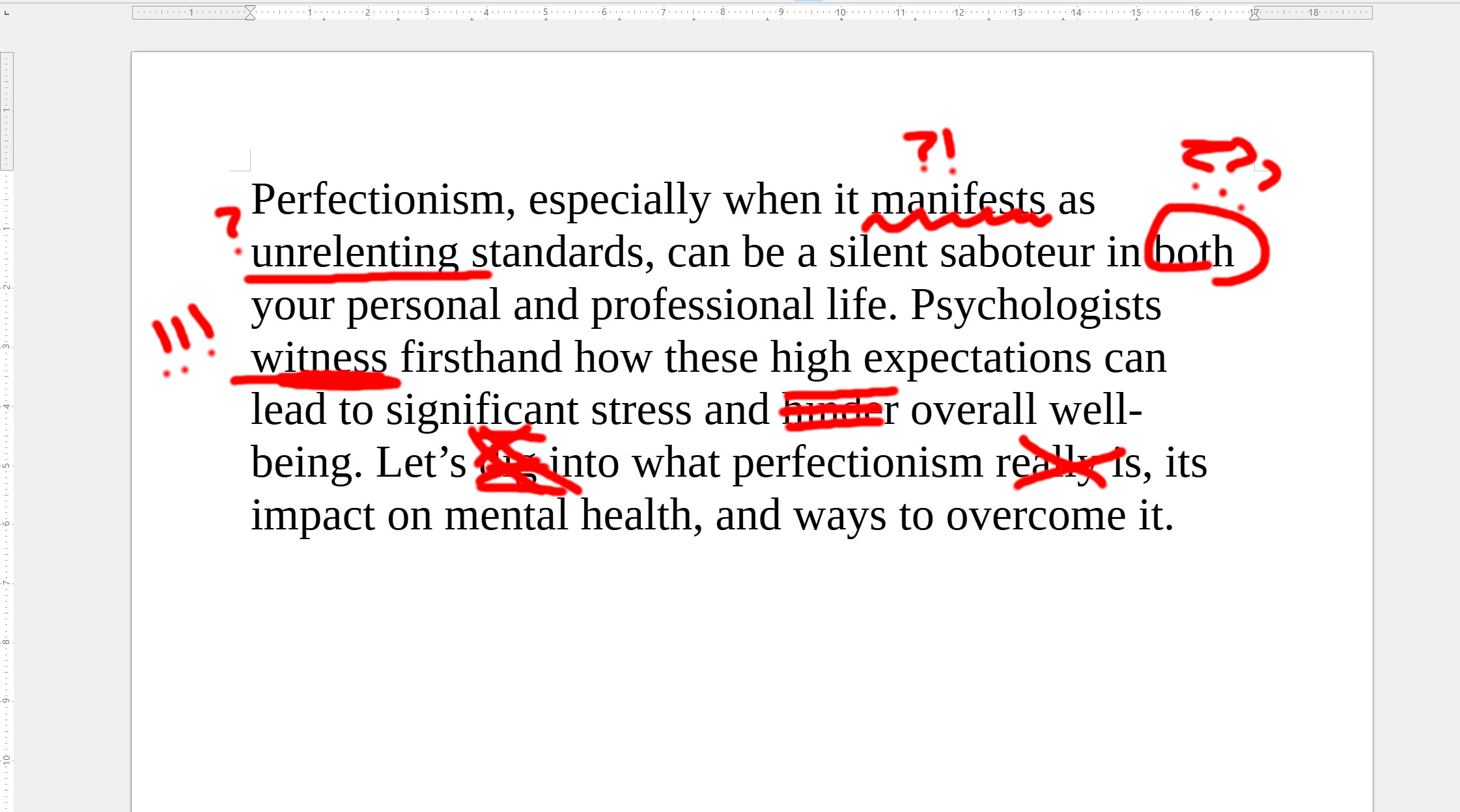Understanding Perfectionism: Breaking Free from Unrelenting Standards
Perfectionism, especially when it manifests as unrelenting standards, can be a silent saboteur in both your personal and professional life. Psychologists often observe firsthand how these high expectations can lead to significant stress and hinder overall well-being. Let’s explore what perfectionism really is, its impact on mental health, and ways to overcome it.
Table of Contents
What Is Perfectionism?
At its core, perfectionism involves setting excessively high standards for yourself and others. This relentless drive for flawless performance often comes with a fear of failure or criticism. Unlike healthy striving, perfectionism can become rigid and inflexible, making it difficult to adapt or accept imperfections.
The Mental Health Toll
Living under the grip of perfectionism can take a serious toll on your mental health. Chronic anxiety, depression, and low self-esteem are common among those who equate their self-worth with their achievements. This constant pressure can create a cycle of self-criticism and dissatisfaction, making it hard to feel good about your accomplishments.
Struggles in Personal and Professional Life
In the workplace, perfectionism can lead to overworking and burnout. High-achieving environments often reward this dedication, inadvertently reinforcing perfectionistic behaviors. This not only affects your productivity but also strains relationships with colleagues, creating a toxic work atmosphere where mistakes are unforgiven.
In personal life, the pursuit of perfection can create feelings of inadequacy and isolation. You might find it difficult to relax or enjoy your achievements, always feeling that something is missing or that you could have done better. This can hinder meaningful connections with family and friends, leading to loneliness and emotional distress.
Conflict with Others: The Externalisation of Internal Harshness
Perfectionists often project their internal self-criticism onto those around them, resulting in conflicts and strained relationships. This intolerance and harshness towards others stem from their own harsh judgments of themselves. They believe that if they cannot meet their own unrelenting standards, others should also strive to meet these high expectations.
Intolerance and Harshness in Relationships
perfectionist manager may micromanage employees, criticise minor mistakes, and have little patience for ambiguity. This behaviour can create a stressful and unproductive work environment, where team members feel undervalued and fearful of making errors. Additionally, there may be an intolerance towards teammates and junior colleagues who don’t or can’t live up to a perfect standard, further exacerbating tension and reducing morale.
In friendships or romantic relationships, perfectionists may impose rigid expectations, expecting partners or friends to meet exacting standards in behaviour, appearance, or achievements. This can lead to frequent arguments, resentment, and a breakdown of trust and mutual support.
Given these struggles, overcoming perfectionism not only helps the person with unrelenting standards, but helps everyone else around them too.
Rationalising Harshness
Perfectionists often justify their critical behaviour by believing that others need to perform better. They see their harshness as a means to encourage improvement, not recognising that their actions may instead foster resentment and hinder genuine growth. This externalisation of self-criticism masks their underlying vulnerability and fear of failure.
Example
Consider “S”, a project manager who insists that every team member’s work must be flawless. When a colleague submits a report with minor errors, S harshly criticises it in front of the team. Although her intent is to maintain high standards, her approach demoralises her team, leading to decreased morale and increased turnover.
The Impact on Relationships
Perfectionism doesn’t just affect you—it can also strain your relationships. By imposing unrealistic expectations on others, you may create unnecessary conflicts and dissatisfaction. This can make it challenging to maintain healthy, supportive relationships, as both you and those around you feel the pressure to meet unattainable standards.
Do you or your loved one need some support? We are here to help!
Early Experiences Shaping Perfectionism
The roots of perfectionistic tendencies are often traced back to early life experiences. Growing up in environments that emphasise high achievement and impose strict standards can significantly shape an individual’s propensity for perfectionism.
Strict and “Nothing-Is-Good-Enough” Parenting
Children raised by parents who have exceedingly high expectations and rarely acknowledge their achievements may develop a belief that their worth is contingent on flawless performance. This fosters a constant fear of failure and an internal drive to meet these parents’ unrealistic standards.
Example
“J” grew up with parents who praised her only when she achieved top grades or excelled in extracurricular activities. Any minor mistake was met with disappointment rather than support. As an adult, J strives for perfection in her career and personal life, believing that anything less signifies failure and unworthiness.
Growing Up in Highly Competitive Environments
Children exposed to extremely competitive settings, whether in academics, sports, or other areas, may internalise that only the best is acceptable. This environment teaches them to measure their self-worth against others, leading to relentless self-improvement and fear of inadequacy.
Example
“M” participated in a highly competitive youth footie league where only the best players were acknowledged and given opportunities to advance. This experience ingrained in him a fear of not being the best, driving his perfectionistic behaviour in his professional life, where he constantly seeks to outperform his peers to validate his self-worth.
Overcoming Perfectionism
Breaking free from perfectionism starts with recognising and challenging these unrealistic standards. Here are some strategies that can help.
Cognitive Behavioural Therapy (CBT)
CBT therapy in Sydney is highly effective in addressing perfectionistic thoughts. It helps you identify and reframe distorted thinking patterns, encouraging you to set achievable goals and appreciate effort over flawless outcomes.
Mindfulness Practices
Mindfulness encourages present-moment awareness and non-judgmental acceptance. Practices like guided meditation and mindful self-compassion can reduce self-criticism and promote a kinder relationship with yourself.
Self-Compassion
Learning to treat yourself with understanding and kindness is crucial. Instead of harsh self-judgment, practice self-compassion by acknowledging your efforts and embracing imperfections as part of being human.
Setting Realistic Goals
Use techniques like SMART goals (Specific, Measurable, Achievable, Relevant, Time-bound) to break down larger tasks into manageable steps. Emphasis on Achievable! This helps prioritise what’s truly important and allows flexibility in outcomes.
Building Support Networks
Surround yourself with supportive friends, family, or support groups. Sharing your experiences and coping strategies with others who understand can reduce feelings of isolation and foster a sense of community.
Real-Life Stories
Take “E”, a sales executive who constantly sets impossibly high standards for her work. Her pursuit of perfection led to chronic stress and burnout, making it hard for her to enjoy her achievements. Through therapy, E learned to recognise and challenge her rigid standards, allowing herself to produce work that was “good enough.” This shift not only improved her mental health but also enhanced her productivity and job satisfaction.
Similarly, “T”, a software engineer, found himself paralysed by the need for flawlessness in his projects. This obsession led to friction with his teammates, missed deadlines, and increased anxiety. After engaging in schema therapy, T began to adopt a more balanced approach, setting realistic goals that boosted his confidence and improved his work-life balance.
Meet “A,” a paramedic who constantly set impossibly high standards for his performance during emergencies. His pursuit of perfection led to chronic stress and burnout, making it difficult for him to find satisfaction in the lifesaving work he did every day. Recognising the toll it was taking, A sought help from a psychologist for first responders, a professional trained to understand the unique pressures of the job. Through therapy, A learned to recognise and challenge his rigid standards, allowing himself to see that his efforts, even when not flawless, were “good enough” and still made a profound difference in the lives of his patients. This shift not only improved his mental health but also restored his passion for his work and strengthened his ability to cope with the intense demands of being a paramedic. The psychologist highlighted the importance of self-compassion, helping A understand that being human was not a failure but a necessity in a profession that thrived on resilience.
Creating a Healthier Work Environment
For professionals, fostering a supportive work environment is key to managing perfectionism. Managers can help by setting clear and realistic performance expectations, encouraging open dialogue, and recognising individual contributions. Creating a culture where mistakes are seen as learning opportunities rather than failures can significantly reduce stress and promote a healthier, more cohesive team dynamic.
Strategies for Managers to Support the Team of Perfectionists
Establish and communicate transparent performance criteria to ensure that all team members understand expectations, reducing the ambiguity that perfectionists might exploit to enforce their standards.
Provide constructive feedback that focuses on growth and improvement rather than solely on outcomes. Highlighting effort and progress can help perfectionists appreciate their development without fixating on flaws.
Regularly acknowledge and celebrate individual and team accomplishments, small or large. This reinforces positive behaviours and reduces the constant need for validation through perfect results.
Moving Forward
Understanding and addressing perfectionism is essential for your mental health and overall happiness. By recognising the signs and implementing strategies to manage unrelenting standards, you can cultivate healthier self-expectations and improve your quality of life. Remember, striving for excellence is admirable, but embracing imperfection is equally important for your well-being.
If you find yourself struggling with perfectionism, seeking professional guidance can make a significant difference. Your therapist can help you to work towards a more balanced and fulfilling life, free from the constraints of unrelenting standards.
Please note that this blog post by Personal Psychology, psychologists in North Sydney is not intended to provide professional advice. If you or someone you know is experiencing mental health difficulties, it is important to seek help from a qualified healthcare professional.




